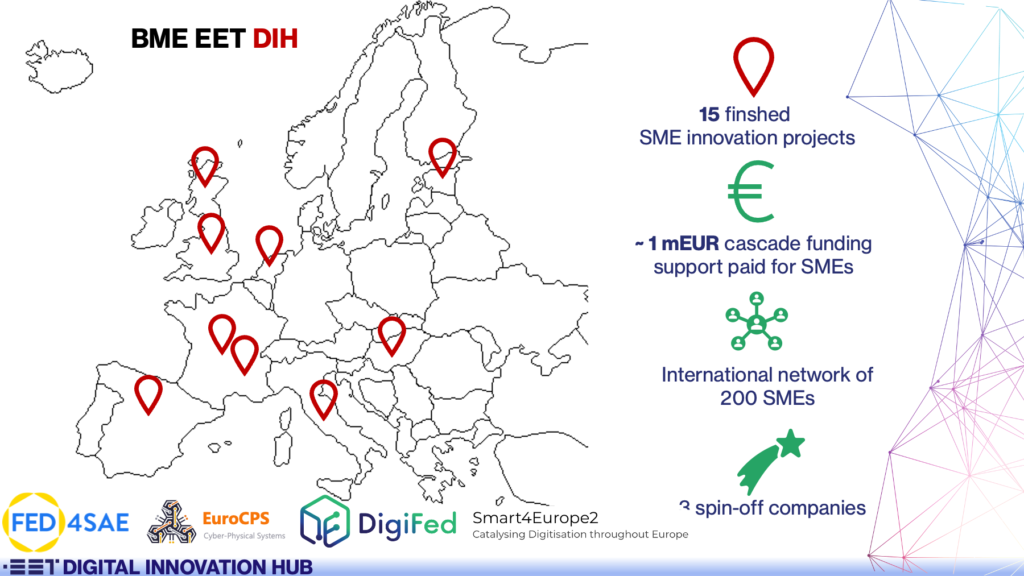About
Digital Innovation Hubs are one-stop-shops that help companies to become more competitive with regard to their business/production processes, products or services using digital technologies. BME-EET DIH has decades long experience in the multi-physical design and modelling of electronics systems. This professional experience helps innovative companies to test and validate their product ideas before invest, be faster on the market with new products, be more competitive by using up to date design methods.
EET-DIH in numbers

News
Aug 25 Aug 25 Jun 25 Mar 25 Dec 24 Dec 24 Aug 24 Jan 24 Dec 23 Sep 239
First Smart Systems Integration Solutions Thesis Project Workshop
7
SSI Summer School 2025
11
CHIPCER Final Meeting 30 June 2025
10
Dr. Siegfried Krainer speaks on: The return of physics in Seminconductor Industry
27
V4 project meeting in Budapest 13-14 January 2025
6
PowerizeD review meeting Budapest 2025
12
SSI Summer School 2024
2
2024 Jan 8 – Fenntartható Elektronika Szeminárium | MTA – MTO – EETTB
4
SelfDiagnostics CEO Marko Lehes’ seminar on the story of the Multitest – Europe’s first pocket PCR device
18
Professor Guo Qi Zhang’s seminar on Global technology and industry landscape of semiconductors
Services
AI-assisted lifetime prognostics for LED and power electronics applications
Category: Design and testing support
Service type: Consultancy and implementation
Description of the service:
Estimation of the remaining useful lifetime (RUL) of power semiconductor devices such as LEDs or IGBTs is a hot topic. Digital twinning technologies are foreseen to support such prognostics tasks in an Industry 4.0 approach. To obtain sufficiently large set of reliability test data to setup the digital twins for operational environments is not a trivial task. Research is ongoing to involve AI techniques to bridge that gap. The service offered bridges the gap between SMEs and cutting edge research that BME EET is involved in.
Expected outcomes:
A methodology to create digital twins to support Industry 4.0 compliant operation of LED / power semiconductor component based systems / infrastructures through executable digital twins capable of considering the elapsed mission profiles of the critical components for predicting the RUL of the system. Based on the commonly agreed methodology tailored to the application needs the right digital twin can be created.
Typical case studies:
An LED luminaire with ageing and temperature compensated constant light output control where the digital twin plays an active role in the control mechanism.
Further info about the technical background.
Testing, modelling and simulation methodologies of LEDs aimed at improved luminaire price/performance ratio
Category: Design support
Service type: Consultancy and implementation
Description of the service:
BME-DIH offers the required testing, modelling and simulation capabilities completed related consulting services, including the technical support for the implementation. The subsequent images show such an LED luminaire engineering prototype, measured at BME’s thermal and reliability testing facility.
Expected outcomes:
With the comprehensive LED testing and modelling that we offer, important LED features not reported by LED vendors on their data sheets can also be considered in your design.
Typical case studies:
The overall LED digital twin based workflow is in use by a leading European based multinational lighting company and at a few French SME-s as well.
Further info: link
Thermal design support with analytical methods and numerical simulations (CFD, FDM)
Category: Design support
Service type: Consultancy & implementation
Description of the service:
Thermal design consultancy and support for PCBs, servers and server rooms. Elaboration of electronics cooling solutions.
Expected outcomes:
A report of suggested design modifications, state-of-the-art, adaptive electronics cooling solutions, housing, packaging suggestions
Typical use cases:
High performance server racks with minimal form factors
Conceptual design support
Category: Design support
Service type: Consultancy
Description of the service:
System level design and hardware-software co-design of complex architectures, infrastructures, and databases. Implementation technology selection. Technical requirements formalization.
Expected outcomes:
Report of suggested design concept and implementation technologies
Multidomain Digital Twins for PV devices
Category: Design support
Service type: Consultancy & implementation
Description of the service:
Thermal/electric/spectral multidomain modelling of photovoltaic cells and modules
Expected outcomes:
Software implemented models, reports
Typical use cases:
Power/operational predicion of photovltaic devices and PV plants
Thermal aware heterogeneous integration design support and prototyping/characterisation
Category: Design support
Service type: Consultancy & implementation
Description of the service:
The service provides design consultancy and R&D support in the field heterogen integrated system. Special expertise can be focused on the thermal/cooling issues of such intgrated systems.
Expected outcomes:
Report of suggeted technical solutions, test specimen and prototype implementation, characterisation report
Non-destructive analysis of heat paths of critical components by thermal transient measurements
Category: Failure analysis
Service type: Consultancy and implementation
Description of the service:
Thermal performance characterisation from raw materials to components, be it a passive or an active, in-situ or prepared sample. We can compare different batches, help with warranty claims or just refine datasheet information. The method can be combned with other services of the Thermal, Optical and Reliability Laboratory, especially with Thermal imaging or with Reliability testing.
Expected outcomes:
The report can range from from a single Rth value to a detailed heatflow path evaluation with highlighting the thermally compromised layers, even with enhancement tips or technical ideas for future design updates.
Typical case studies:
Thermal performance characterisation of faulty or reference samples, reliability testing related structural monitoring
Thermal imaging and hot-spot analysis
Category: Failure analysis
Service type: Consultancy and implementation
Description of the service:
Capturing temperature distribution on the die of decapsulated integrated circuits, on PCB and component level, inside junction boxes even at large scales as architectural level.
Expected outcomes:
The report can range from a single temperature value of interest, up to a set of thermal images or video recordings up to 100fps, with areas evaluated and data exported, backed up by highlights and remarks from our thermal experts.
Typical case studies:
Failure detection or analysis with thermal performance characterisation of faulty or reference samples
Reliability testing
Category: Characterisation
Service type: Consultancy and implementation
Description of the service:
The reliability test environment integrates a set of appropriate hardware and software components built around the de facto industry standard Thermal Transient Tester (T3Ster) equipment of Siemens. The system monitors the electric, thermal or even optical parameters of the device under test during freely customizable test sequences.
Expected outcomes:
Test report with e.g. temperature and relative humidity logs, highlighted change in thermal performance, processed samples with predefined aging history.
Typical case studies:
Reliability tests on up from component level (RF modules, sensors, PSUs, drivers, LEDs, FETs) to project demonstrators. Typical use cases range from functional tests and real application environment simulations on IoT and CPS based devices, to thermally and moisture induced package and silicon level failure mode monitoring during lifetime tests.
Further info: link
3D printing
Category: Design support
Service type: Consultancy and implementation
Description of the service:
Build-up of project demonstrators are backed-up by our 3D printing team to aid the design process and to ease the final steps before project evaluation.
Expected outcomes:
Structural or design elements printed with FDM or SLA technology.
Typical case studies:
Custom crafted sensor housings, sample holders, junction boxes, adapters.
Clean room processing services
Category: Technology access
Service type: Consultancy & implementation
Description of the service:
Processing of semiconductor samples in ISO Class 6 environment. Available process steps: litography, diffusion doping, high temperature steps, wet chemical processing, deposition of conductor and insulator layers, including characterisation techniques for the process steps.
Expected outcomes:
Technology/process report, processed samples/devices.
Short course on thermal transient testing
Category: Training
Service type: Education
Description of the service:
PDC for thermal experts who want to get deeper insight into selected areas of thermal transient testing and its applications
Expected outcomes:
Course and course material
Success stories
Secure monitoring of medical samples throughout the lab
High-throughput medical-diagnostics laboratories and bio-banks face an ever- growing number of biomedical samples to be processed and stored locally. This requires reliable and secure identification of test tubes in the entire laboratory ecosystem. The innovative solution called SmartLAB responds to all these challenges. With Intel’s embedded Edison platform, the system uses RFID-tagged test tubes and sample holders. The touchless and highly flexible radio-frequency-identification technology ensures reliable and secure monitoring of test tubes. More info: link
Partner: Neumann DX, Hungary
Smart street lighting increases safety, reduces energy use
Citizens’ feelings of safety while walking in the city at night correlate strongly to light levels. For municipalities, this presents the challenge of providing sufficient light at clearly reduced levels of energy consumption. In response, this project developed an upgradeable,
re-configurable lighting-control solution constituting a “future-safe” investment with clear benefits both for citizens and operators of the lighting installations. More info: link
Partner: Hungarolux Kft, Hungary
Smart, Portable Lab-on-a-Chip System to Detect and Report Water Pollution in Real Time
Despite concerted EU efforts to minimize water pollution, many of Europe’s rivers, lakes and groundwater reservoirs are still threatened by municipal, agricultural and industrial waste. This project developed a portable lab-on-a-chip system for monitoring surface-water and industrial effluents. It measures pH, nitrate, nitrite, phosphate and ammonia simultaneously in real-time, while controlling data acquisition and data processing and delivery to the cloud, which allows remote access to real-time results from any smartphone, tablet or PC. More info: link
Partner: Tellab, Ireland
Making A Self-Contained Air Drumming Instrument
The developed solution resulted in an embedded IoT based musical instrument that people can use with a mobile phone, tablet or virtual reality headset. This means solving the problem of doing high speed real time motion tracking and low latency audio rendering on an affordable IoT hardware platform. More info: link
Partner: Aerodrums, UK
New Low Consumption And Autonomous Soil Humidity Sensor With Fast Deployment
Water is a key resource for agriculture both for the economic and environmental sustainability. The volume of water used for irrigation per year in EU-28 is 39.8 billion m3. However, effective irrigation is only 35% of this amount. The project aimed to design a low cost Cyber-Physical-System that will integrate sensing, logging and remote communication functionalities. Using the latest low consumption IoT technologies such as Ultranarrow Band protocols and the new generation of low power microprocessors. More info: link
Partner: EncoreLab, Spain
Real-Time, Automated Light Type Monitoring And Optimal Control In Horticulture
Despite the scientifically proven relevance of diffuse sunlight for crop production improvement, commercial light sensing technologies do not allow to effectively and affordably implement an automated control of shadings systems in horticultural practices. In this project we integrated a cyber-physical system gathering real-time information about the type of sunlight available in greenhouses under continuously changing irradiation conditions, and providing input for controlling shading screens so as to optimize crop growth. More info: link
Partner: Alitec SRL, Italy
Contact
Budapest University of Technology and Economics
Department of Electron Devices
Magyar Tudósok Körútja 2. BME Q 3rd floor
H-1117
Budapest
Hungary

© EET-DIH 2023

